英文写作指导——练写段落主题句topic sentences practice
(写作知识)如何写好TopicSentence-高级英语写作-北外网院论坛之家-Powe...

(写作知识)如何写好TopicSentence-高级英语写作-北外网院论坛之家-Powe...[写作知识]如何写好Topic Sentence本帖最后由 Tdengyajiao 于 2010-4-1 15:08 编辑如何写好Topic SentenceImportant Topic Sentence in a PassageThe topic sentence properly used can achieve unity in the paragraph, which indicates the importance of the topic sentence.But what is the topic sentence? The topic sentence is an EMPHATICALLY placed, EXPLICIT statement of the central idea in a paragraph. A good topic sentence in a paragraph will help the writer to focus on his subject, prevent him from introducing unrelated material.How does a topic sentence work then? A topic sentence does two things:1) it lays down the subject2) it puts forth the main idea about the subjectsuppose we are asked to write a paragraph on each of the following subjects:1)Subject: MusicFocus: … is interesting and enjoyable.2)subject: Educationfocus: … is very important in the modern world.3)Subject: DramaFocus: I like …Now we have some topic sentences (which may or may not be good topic sentences—that is the question we are going to discuss below). Clearly each of the topic sentences has two parts: a subject and something said about the subject, we can call it the focus.But are they good topic sentences? Surely not! Take the subject “music” for instance.Ask ourselves, “what do we mean by music? What kind of music? Do we mean symphonic music, chamber music, pop music or other sources? How can we cover so many types of music in one paragraph? Or in a short article of 150 to 200 words?”Focus: … is interesting and enjoyable.Ask ourselves again, “ what do we mean by interesting and enjoyable? Look in a dictionary, interesting—exciting curiosity or attention, enjoyable—agreeable. These two words don’t say very much about music. They simply express approval and they are FAR TOO VAGUE for a good topic sentence.We can find that “Music is interesting and enjoyable” makes a bad topic sentence—bad because the subject is too broad; bad because the focus is vague.(Could you provide a satisfying topic sentence for the subject "music"??)The same is true of each of the following examples:Science fiction is always exciting.Water pollution is a big problem.Life began in a strange way.What makes good topic sentences then? A good topic sentence has a limited subject and a sharp focus. That is, neither too general nor too narrow. A topic sentence that is too general leaves little to be said in the rest of the paragraph. Too general requires much more paragraphs to develop it.Here are some simple, factual statements that are too narrow to require any development or support:1)I live in an apartment.2)Last summer I worked as a gas station attendant.3) Many children watch cartoons on Saturday morning.The following, in contrast, are assertive statements that we can write about in a paragraph1) Living in an apartment has its drawbacks/advantages.2) Working as a gas station attendant was the worst job I ever had last summer.3) Some experts feel that violence in cartoons is bad for children.You can provide better topic sentences than that of the above. Why not have a try?Exercises: revise the following topic sentences to narrow the focus by stressing a controlling idea.Eg. Original: Today many young people have developed a culture of their own.Revision: Long hair, colorful clothing, and new musical forms are part of the new culture of many of today’s young people.Eg. The Santana is a fine car.à Super engine performance and beautiful design make the Santana a find automobile.1) Participation in college sports is beneficial.2) Motion pictures should be censored.3) People could make a better use of their leisure time.4) China should take a stronger role in world affairs.5) Studying a foreign language is useful.6) Online education is becoming more important every year.( No fixed answer to each question. Please provide your answer and let’s have some discussion here)MORE EXPLANATION ABOUT TOPIC SENTENCE-------------------------------------------What is a topic sentence?A topic sentence states the main point of a paragraph: it serves as a mini-thesis for the paragraph. You might think of it as a signpost for your readers—or a headline—something that alerts them to the most important, interpretive points in your essay. When read in sequence, your essay's topic sentences will provide a sketch of the essay's argument. Thus topics sentences help protect your readers from confusion by guiding them through the argument. But topicsentences can also help you to improve your essay by making it easier for you to recognize gaps or weaknesses in your argument.Where do topic sentences go?Topic sentences usually appear at the very beginning of paragraphs. In the following example from Anatomy of Criticism, Northrop Frye establishes the figure of the tragic hero as someone more than human, but less than divine. He backs up his claim with examples of characters from literature, religion and mythology whose tragic stature is a function of their ability to mediate between their fellow human beings and a power that transcends the merely human: The tragic hero is typically on top of the wheel of fortune, half-way between human society on the ground and the something greater in the sky. Prometheus, Adam, and Christ hang between heaven and earth, between a world of paradisal freedom and a world of bondage. Tragic heroes are so much the highest points in their human landscape that they seem the inevitable conductors of the power about them, great trees more likely to be struck by lightning than a clump of grass. Conductors may of course be instruments as well as victims of the divine lightning: Milton's Samson destroys the Philistine temple with himself, and Hamlet nearly exterminates the Danish court in his own fall.The structure of Frye's paragraph is simple yet powerful: the topic sentence makes an abstract point, and the rest of the paragraph elaborates on that point using concrete examples as evidence.Does a topic sentence have to be at the beginning of a paragraph?No, though this is usually the most logical place for it. Sometimes a transitional sentence or two will come before a topic sentence: We found in comedy that the term bomolochos or buffoon need not be restricted to farce, but could be extended to cover comic characters who are primarily entertainers, with the function of increasing or focusing the comic mood. The corresponding contrasting type is the suppliant, the character, often female, who presents a picture of unmitigated helplessness and destitution. Such a figure is pathetic, and pathos, though it seems a gentler and more relaxed mood than tragedy, is even more terrifying. Its basis is the exclusion of an individual from the group; hence it attacks the deepest fear in ourselves that we possess--a fear much deeper than the relativelycosy and sociable bogey of hell. In the suppliant pity and terror are brought to the highest possible pitch of intensity, and the awful consequences of rejecting the suppliant for all concerned is a central theme of Greek tragedy.The context for this passage is an extended discussion of the characteristics of tragedy. In this paragraph, Frye begins by drawing a parallel between the figure of the buffoon in comedy and that of the suppliant in tragedy. His discussion of the buffoon occurred in a earlier section of the chapter, a section devoted to comedy. The first sentence of the current paragraph is transitional: it prepares the way for the topic sentence. The delayed topic sentence contributes to the coherence of Frye's discussion by drawing an explicit connection between key ideas in the book. In essays, the connection is usually between the last paragraph and the current one.Sometimes writers save a topic sentence for the end of a paragraph. You may, for example, occasionally find that giving away your point at the beginning of a paragraph does not allow you to build your argument toward an effective climax.How do I come up with a topic sentence? And what makes a good one? Ask yourself what's going on in your paragraph. Why have you chosen to include the information you have? Why is the paragraph important in the context of your argument? What point are you trying to make?Relating your topic sentences to your thesis can help strengthen the coherence of your essay. If you include a thesis statement in your introduction, then think of incorporating a keyword from that statement into the topic sentence. But you need not be overly explicit when you echo the thesis statement. Better to be subtle rather than heavy-handed. Do not forget that your topic sentence should do more than just establish a connection between your paragraph and your thesis. Use a topic sentence to show how your paragraph contributes to the development of your argument by moving it that one extra step forward. If your topic sentence merely restates your thesis, then either your paragraph is redundant or your topic sentence needs to be reformulated. If several of your topic sentences restate your thesis, even if they do so in different words, then your essay is probably repetitive.Does every paragraph need one?No, but most do. Sometimes a paragraph helps to develop the same point as in the previous paragraph, and so a new topic sentence would be redundant. And sometimes the evidence in your paragraph makes your point so effectively that your topic sentence can remain implicit. But if you are in doubt, it's best to use one.。
英语写作的主题句和段落
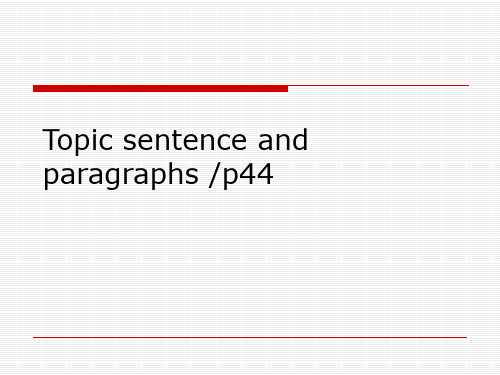
在另外一篇作文Part of My Childhood中,作者开头是这样写 的: In my childhood, there were so many things that were worth calling to mind. Some made me happy, some made me excited, and some made me sad. But among them was an unforgettable thing, when I think of it, my good friend Tong Tong will occur to me. 作为汉语读者来说,首先用抒情的笔法奠定一种氛围,然后引导 读者逐渐进入对于往事的回忆,这样的开头是非常自然而且感人 的。但是美国编者显然不这样认为: This is a moving story about friends who have quarreled. It needs a good topic sentence to bring the reader into the feelings and message the writer wants to convey. 这位美国编者提供了这样的开头:
A little girl taught me, and a busful of people, an important lesson about the importance of thinking more of other people than of ourselves. One day I took a very crowded bus to school…
Even when we are very careful in the things we do each day, the risk of loss and injury is always with us. Starting the day with a shower, we risk slipping and falling through the glass door. Riding to work, we risk collision. While we are away from our homes, the risk of fire and burglary is greater. Going to school, our children risk being injured. We also loss through unintentional actions of our own that might injure others. Such events may occur regardless of how careful we may try to be, and they can cost us a lot of money. Rather than taking the chance of being wiped out financially, we transfer some or our risks to others, we buy insurance.
英语段落写作要领
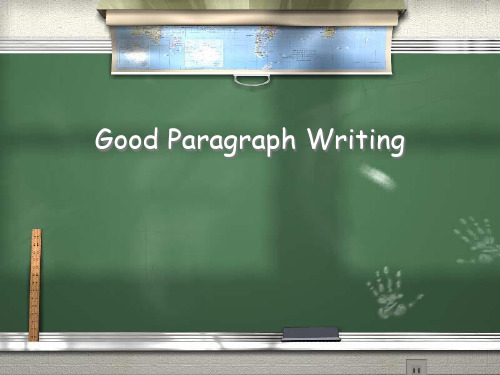
Completeness
A complete paragraph is well-developed. It has neither too little information nor too much. Counting the number of sentences provides only a rough estimate of completeness. The important point is whether the ideas adequately support the topic sentence.
Purpose: Audience
Whenever you do any type of writing, ask yourself, “Who are my readers?” Your readers are your “target audience”. You are writing for them.
summarize the paragraph, and/or
provide a transition to the next paragraph.
Warning!
When summarizing, don’t simply repeat the topic. This can lead to boring pieces of writing. If you can’t think of a meaningful way to summarize the paragraph, just make sure that your last sentence provides a good transition to the next paragraph.
英语作文写作开头句topic-sentence

• Most US universities require a 550 point TOEFL score for a number of reasons.
• Air pollution in Mexico City is the worst in the world for a number of reasons.
Analysis:
This sentence is not appropriate as a topic sentence because it mentions two topics, not just one. Paragraphs are usually about one main thing and so their topic sentences should also be about only one main thing.
3) Clouds are white. Analysis
The problem with this sentence is that it is too general. It is also very boring! Would you like to read a paragraph with this topic sentence? Most people would not.
The topic tells the reader what the paragraph is about. (general)
The controlling idea is a key word or phrase that expresses the basic point of a paragraph.(specific)
中考英语书面表达题写作训练_写作指导

中考英语书面表达题写作训练做中考英语书面表达题,一般按下列步骤进行:一、认真审题看到考题后,先不要急于动笔,要仔细看清题目要求。
审题时要看清文字说明、图画、图表、提纲或短文提供的资料和信息,以及参考词汇,字数要求等等。
如果是几幅图要将几幅图结合起来看,才能弄清人物关系和故事情节。
还要审文体,确定格式,确定人称,确定主体时态。
二、列出要点要点是给分的一个重要因素,为了防止写作过程中遗漏要点,同学们要在看清看懂所有文字、图画、参考词汇的基础上,在草稿纸上将各个要点逐条列出。
三、写出词句用英语写出各个要点的关键词语或句型,并用地道的英语句子将各个要点逐一表达出来。
四、连句成文根据各个要点之间的关系,使用恰当的关联词语(详见语篇基础),将各个句子连接成通顺流畅的短文。
并注意以下几点:避免使用汉语式英语,尽量使用自己熟悉的句型。
注意长短句交错,几种句型可交替使用,以避免重复和呆板。
五、细心检查短文写好后还要细心检一篇,看是否正确无误。
你可主要检查:(1) 人称是否用错,并注意人称代词的主格和宾格形式是否有错;(2) 动词的时态形式是否准确无误,特别注意查看一般现在时主语是第三人称单数时谓语动词是否加了(e)s;(3) 名词的复数形式;(4) 单词拼写、标点符号和大小写是否有错;(5) 格式是否有错。
六、誊入试卷经检查,准确无误后,才誊入试卷。
要特别注意书写工整,卷面整洁。
阅卷时正值天气炎热,老师工作量之大,时间紧迫,书写是否工整,卷面是否整洁与得分高低直接有关,同学们务必注意。
二、英语作文如何得高分一般说来,每次考试后,阅卷老师要在很短的时间内评阅完大量的试卷,工作量非常大。
尽管作文评分有具体的标准,但它仍然是主观性较大的部分,而且写作部分没有“半分”的评分标准,有时我们阅卷之时的一念之差,就可能令你失去宝贵的一分。
因此,这里我觉得介绍一些这些阅卷老师阅卷时的心理,对考生是极为有用的。
1.整洁的卷面和漂亮的书写漂亮的书写令人赏心悦目,可使阅卷老师从疲惫不堪中解脱出来,给阅卷老师留下良好的第一印象。
英语段落写作技巧学习

英语段落写作技巧学习段落是构成篇章的基础,学习英文篇章必须从段落写作开始。
下面是店铺带来的英语段落写作技巧,欢迎阅读!英语段落写作技巧精选主题句与推展句1. 主题句主题句(topic sentence)是表达段落主题的句子。
它用以概括段落大意,要求全段其他文字都围绕它展开。
请看下例:My mother has passed along to me certain rules for getting along with others. Don't argue with parents; they will think you don't love them. Don't argue with children; they will think themselves victimized. Don't argue with spouses; they will think you are a tiresome mate. Don't argue with strangers; they will think you are not friendly. My mother's rules, in fact, can be summed up in two words: Don't argue.主题句中提出的"certain rules" 指的是什么?展开句中通过四个"Don't argue --" 逐一加以交代。
从结构来看,这是一个比较典型的段落,它包括了主题句,推展句和结论句(即本段中的末句)。
1.1 主题句的位置主题句通常放在段落的开端,其特点是开门见山地摆出问题,然后加以详细说明。
其作用是使文章的结构更清晰,更具说服力,便于读者迅速地把握主题和想象全段的内容。
主题句可以放在段中起到承上启下的作用,或放在段尾起概括全段的作用。
英语写作topic sentence

英语写作中的主题句在英语写作中,主题句是一个非常重要的概念,能够帮助读者更好地理解文章的主题和结构。
本文将介绍主题句的定义、作用和写作技巧。
下面是本店铺为大家精心编写的5篇《英语写作中的主题句》,供大家借鉴与参考,希望对大家有所帮助。
《英语写作中的主题句》篇1一、主题句的定义主题句是英语写作中的一个重要概念,指的是每个段落的第一句话,用于概括该段落的主题和内容,同时为读者提供指引,让他们更好地理解文章的结构和主题。
主题句通常是一个简明扼要的句子,它应该清晰地表达出该段落的主题和重点。
二、主题句的作用主题句的作用非常多,主要包括以下几个方面:1. 概括段落内容:主题句应该能够概括该段落的主要内容,让读者对该段落的主题有一个清晰的了解。
2. 指引读者:主题句应该能够为读者提供指引,让他们更好地理解文章的结构和主题。
通过阅读主题句,读者应该能够了解该段落在整篇文章中的位置和作用。
3. 突出重点:主题句应该能够突出该段落的重点,让读者更好地理解文章的重点和主旨。
三、主题句的写作技巧写作主题句需要掌握一些技巧,主要包括以下几个方面:1. 简明扼要:主题句应该简明扼要,不要使用过多的词汇和复杂的句子结构。
2. 突出重点:主题句应该突出该段落的重点,不要包含太多无关的信息。
3. 与文章内容相呼应:主题句应该与文章内容相呼应,不要出现矛盾或不相关的内容。
4. 避免使用结论性词语:主题句应该避免使用结论性词语,如“因此”、“所以”等,因为这些词语可能会误导读者对该段落的理解。
英语写作中的主题句是一个非常重要的概念,能够帮助读者更好地理解文章的主题和结构。
《英语写作中的主题句》篇2英语写作中的主题句是指在文章或段落中,用来表达主题或中心思想的句子。
主题句通常出现在文章或段落的开头,用于引入和概括后续内容。
在写作中,主题句的运用可以帮助读者更好地理解文章结构和主题,同时也可以帮助作者更好地组织文章思路。
一个好的主题句应该具有以下特点:1. 简洁明了:主题句应该用简短的语言表达出文章或段落的主题,不宜过于复杂或冗长。
topic sentence英语主题句

讲解主题句是一个完整的句子,用以概括、叙述或说明该段落的主旨大意。
每一个段落只能有一个主题,全段的其他文字都应围绕它展开。
主题句通常由两部分组成,即主题(topic) +中心思想(controlling idea)。
中心思想的作用是导向(control) 和制约(limit) 主题。
所谓导向就是规定段落的发展脉络,所谓制约就是限制主题的覆盖范围,两者不可分割。
没有导向,内容就会离题或偏题;没有制约,内容就可能超出一个段落所能容纳的范围。
下面的8个句子都是很漂亮的主题句,其中红色加粗的文字为主题,绿色斜体的文字为中心思想:1. People can avoid burglaries(入室行窃)by taking certainprecautions.( 接下来作者将围绕着“防范措施”展开段落)2. There are several advantages to growing up in a small town.( 接下来作者将围绕着“优点”展开段落)3. Most US universities require a 550 point TOEFL score for anumber of reasons.( 接下来作者将围绕着“原因”展开段落)4. Fixing a flat tire on a bicycle is easy if you follow these steps.( 接下来作者将围绕着“步骤”展开段落)5. There are several enjoyable ways to travel between the US andQueretaro.( 接下来作者将围绕着“方法”展开段落)6. Effective leadership requires specific qualities that anyone candevelop.( 接下来作者将围绕着“品质”展开段落)7. Industrial waste poured into Pearl River has led to dramaticchanges in its ability to support marine life.( 接下来作者将围绕着“变化”展开段落)8. In order to fully explore the wreck(残骸)of the Titanic, scientistsmust address several problems.( 接下来作者将围绕着“问题”展开段落)通过对上面8个主题句的分析可见:段落的主题句对主题的限定主要是通过句中的关键词来实现的。
英语段落写作方法与技巧

英语段落写作方法与技巧英语段落写作方法与技巧一、构成段落的三大组成部分段落是篇章构成的基本单位之一,段落结构组织得是否合理在很大程度上会影响篇章的整体结构及效果。
典型的英语段落包括一个主题句(topicsentence),若干扩展句(supporting sentences),必要时还有一个结论句(concludingsentence)。
主题句表达的是段落的中心思想,是段落展开的核心,是为整篇文章的中心服务的;而扩展句则具体地描述、说明、阐述或论证主题句体现的中心思想。
结论句往往是用来强调、重申主题或归纳、总结段落大意。
(一)主题句主题句对于段落的重要性是毋庸质疑的,因此,主题句的优劣将直接关系到该段落的写作质量。
好的主题句不仅能够起到限定段落基调的作用,而且起到限定主题范围的作用。
主题句明确地限定了段落内容,这样,习作者在搜集、筛选与主题相关的事实、例证、节时才能够较容易地把握住方向。
而且,主题突出的主题句也能使读者一日了然,有利于读者预测下文内容。
倘若段落的主题句过于笼统或模糊,就无法成为整个段落发展的指南针,就难以合理组织相关材料来进一步摇述、说孵或阐述主题,甚至使整个段落乃至整篇文章结构松散、逻辑不清。
(二)扩展句尽管主题句十分重要,但它不能没有扩展句的支持。
扩展句就是对主题句所陈述的思想观点加以展开分类,提出各种细节或例证以阐述或证明主题的各个方面。
扩展句就像是段落的血肉,“有血有肉”的段落才能感染读者、说服读者,才能达到写作的根本目的。
在主题句确定后,习作者就要开始选择和主题有关的信息和素材。
实质上,针对主题测试每~个所选择素材就是一个分类过程。
有一种常用方法就是句子展开前加以设问,然后解答,即设问一解答(why-because)方法。
(三)结论句有时,为了求得段落结构的整体性,习作者喜欢利用段落的最后一句简要地归纳段落大意,或重申段落主题,做到前后呼应。
写结论句时,要特别注意以下三点:(1)不要突然冒出与该段主题不相关甚至相互矛盾的新话题;(2)不要过于冗长;(3)语气不能太武断,应该委婉些。
教你怎么写 topic_sentence

This is the structure of a paragraph! reader a sentence to tell the Generally speaking, these three different what the paragraph is types of sentences play different roles in a mainly about. paragraph:
2) There are two reasons why some people like to buy cars with automatic transmission and two reasons why others like cars with manual transmission. Analysis:
1.Topic sentence; (主题句 ) 2.Supporting sentences;(扩展句/阐述句 ) 3.Concluding sentence. (结论句/结尾句 ) sentences to give more detailed information about the topic sentence. a sentence to end a paragraph or to summarize(总结)the ideas.
This sentence is not appropriate as a topic sentence because it mentions two topics, not just one. Paragraphs are usually about one main thing and so their topic sentences should also be about only one main thing.
初中英语作文写作步骤和语法技巧
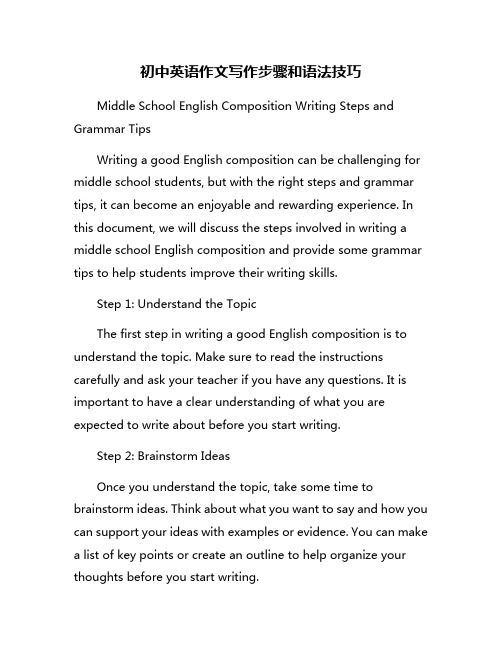
初中英语作文写作步骤和语法技巧Middle School English Composition Writing Steps and Grammar TipsWriting a good English composition can be challenging for middle school students, but with the right steps and grammar tips, it can become an enjoyable and rewarding experience. In this document, we will discuss the steps involved in writing a middle school English composition and provide some grammar tips to help students improve their writing skills.Step 1: Understand the TopicThe first step in writing a good English composition is to understand the topic. Make sure to read the instructions carefully and ask your teacher if you have any questions. It is important to have a clear understanding of what you are expected to write about before you start writing.Step 2: Brainstorm IdeasOnce you understand the topic, take some time to brainstorm ideas. Think about what you want to say and how you can support your ideas with examples or evidence. You can make a list of key points or create an outline to help organize your thoughts before you start writing.Step 3: Write a Thesis StatementA thesis statement is a sentence that sums up the main point of your composition. It should be clear and concise, and it should tell the reader what to expect from your writing. Write your thesis statement at the end of your introduction paragraph.Step 4: Write the Body ParagraphsThe body paragraphs of your composition should support your thesis statement with examples or evidence. Each paragraph should focus on a single idea and include a topic sentence, supporting details, and a conclusion sentence. Make sure to use transition words to connect your ideas and make your writing flow smoothly.Step 5: Write the ConclusionThe conclusion of your composition should summarize your main points and restate your thesis statement in a new way. It should leave the reader with a clear understanding of your argument and why it is important.Grammar Tips:1. Use correct punctuation: Make sure to use commas, periods, and other punctuation marks correctly. Pay attention tothe rules of grammar and punctuation to make your writing clear and easy to read.2. Check your spelling: Always proofread your composition carefully to check for spelling errors. Use a dictionary to look up any words you are unsure about.3. Use correct verb tense: Make sure to use the correct verb tense throughout your composition. Pay attention to whether you are writing in the past, present, or future tense and keep it consistent.4. Use descriptive language: Use adjectives and adverbs to make your writing more interesting and engaging. Paint a picture with your words to help the reader visualize what you are trying to convey.5. Avoid run-on sentences: Make sure to break long sentences into shorter, more manageable chunks. Use punctuation to separate ideas and make your writing easier to follow.By following these steps and grammar tips, middle school students can improve their English composition writing skills and become more confident writers. Practice writing regularly and ask for feedback from your teacher or peers to continueimproving your writing skills. Writing is a skill that can be developed with practice, so keep writing and don't be afraid to make mistakes – it's all part of the learning process.。
Writing The topic sentence (主题句) 英语应用文写作技巧 教学课件
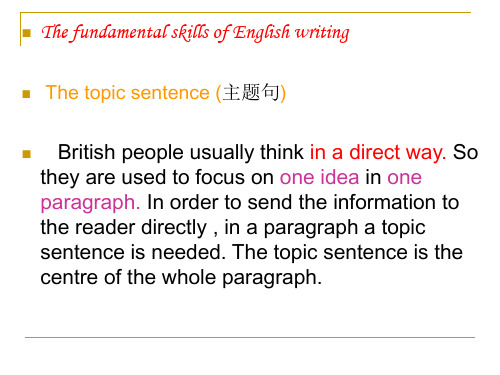
In some places of Peru and Bolivia, one speaks of the future as “ behind oneself” and the past as “ahead”. It makes foreigners puzzled. But the people in those places will explain it by saying:” If you try to see the past and future with your mind’s eye, which can you see? Obviously, it is the past that we can see, and so it must be ahead of us; and the future, which you cannot see, is of course behind you. Such an explanation suggests that there may be opposite ways of describing the same thing, yet they are both reasonable.
The high school student often have to study deep into the night, and their parents become worried. The parents think that they might get ill if they continue like that, so some of them try to persuade their children to work less and rest more. But most of the boys and the girls do not dare to relax even a little. As a result, the parents have to turn to the teachers for help and ask them to assign less homework.
段落写作(主题句+扩展句)
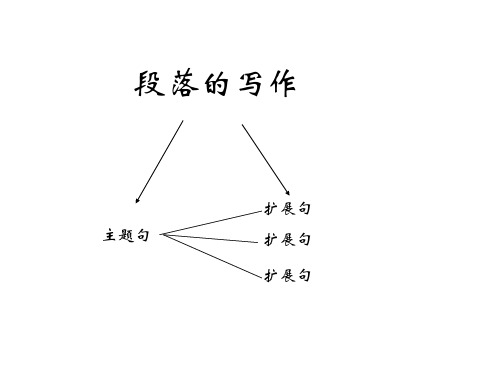
bring the reader into the feelings the writer wants to
convey(传达).
美国编者给这个开头段拟了下面的主题句: One of the most unforgettable experience of my childhood involves my good friend Tong Tong. It happened when I was eight years old…..
than of ourselves. By so doing, our world will be full of happiness. This, of course, is my personal view.
国 学 生
But it is a lesson I have drawn from one of my own 作
See Page 47: 尽管主题句可以出现在段落中的任何位置…
主题句(Topic Sentence)写作的两个基本要求: 第一:要包含主导思想(the controlling idea);
主题句在段落中用于概况段落的主旨大意,准确地表达作者 观点和态度。(See sample topic sentence on Page 43) 注:一个段落要求作者只表达一个意思,不同的意思要放 在另外的段落中表达。
主题句的位置 可以是在段落的开始,也可以处于段落的中间或 者末尾。也有的段落没有主题句。 1)主题句在段首
Jane and Karen have many things in common. To begin with,
both girls have the same background. Jane was born and raised in the West, and so was Karen. Next, both girls are interested in the same kinds of subjects in school. Jane likes French, history, and English. In the same way, Karen likes Spanish, history and English. Furthermore, both girls want to be teachers. Jane plans to become an elementary school teacher. But Karen wants to be a high school teacher. As you can see, the two girls are almost like twins.
写英语作文的技巧通用句子
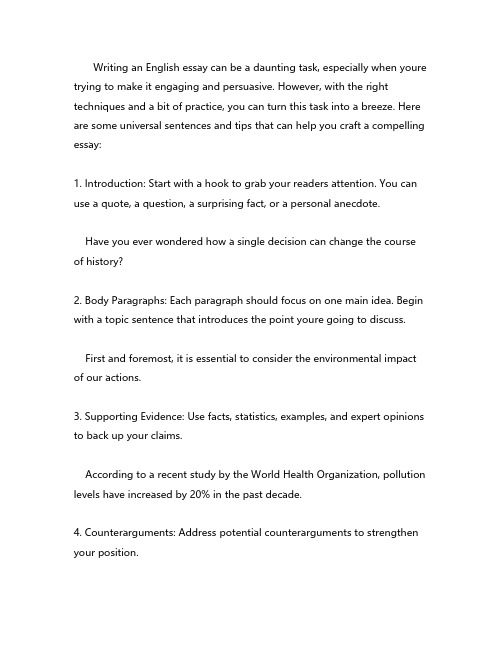
Writing an English essay can be a daunting task, especially when youre trying to make it engaging and persuasive. However, with the right techniques and a bit of practice, you can turn this task into a breeze. Here are some universal sentences and tips that can help you craft a compelling essay:1. Introduction: Start with a hook to grab your readers attention. You can use a quote, a question, a surprising fact, or a personal anecdote.Have you ever wondered how a single decision can change the course of history?2. Body Paragraphs: Each paragraph should focus on one main idea. Begin with a topic sentence that introduces the point youre going to discuss.First and foremost, it is essential to consider the environmental impact of our actions.3. Supporting Evidence: Use facts, statistics, examples, and expert opinions to back up your claims.According to a recent study by the World Health Organization, pollution levels have increased by 20% in the past decade.4. Counterarguments: Address potential counterarguments to strengthen your position.While some may argue that technology is the root of all evil, its important to recognize its potential for good.5. Transitions: Use transitional phrases to guide your reader through your essay smoothly.Building on this idea, we can also explore the benefits of...6. Concluding Paragraph: Summarize your main points and restate your thesis in a new way.In conclusion, the evidence overwhelmingly supports the notion that education is the key to a brighter future.7. Call to Action: End your essay with a call to action, encouraging your reader to think or act on the issue.Let us not stand idly by it is our collective responsibility to create a more sustainable world.8. Word Choice: Use a variety of vocabulary to avoid repetition and to convey your message with precision.Instead of merely saying, one could articulate or proclaim.9. Complex Sentences: Incorporate complex sentences to show your command of the language.Not only does this policy benefit the economy, but it also fosters a sense of community.10. Avoiding Common Mistakes: Be mindful of common errors such as runon sentences, subjectverb agreement, and dangling modifiers.Despite the rain pouring down, the concert was not canceled, much to the delight of the attendees.11. Proofreading: Always proofread your work to catch any grammatical or spelling errors.After finishing the draft, I carefully reviewed it to ensure it was free of errors.12. Personal Touch: Adding a personal perspective can make your essay more relatable.From my own experience volunteering at the local food bank, Ive seen firsthand the impact of community support.13. Citations: If youre using sources, make sure to cite them properly to avoid plagiarism.As Smith 2020 notes in her research, The power of education cannot be overstated.14. Clarity: Ensure your essay is clear and easy to understand, avoiding jargon or overly complex language.In simpler terms, this means that the new policy will benefit everyone involved.15. Engagement: Write in an engaging manner to keep your reader interested throughout the essay.Imagine a world where every child has access to quality education this is not just a dream but a goal within reach.Remember, practice makes perfect. The more you write, the better youll become at crafting essays that are both informative and captivating.。
训练句型英语作文

训练句型英语作文Certainly! Here's a piece of content that focuses on training sentence structures for English composition:Training Sentence Structures in English CompositionWhen it comes to writing English compositions, mastering various sentence structures is crucial for creating a well-rounded and engaging piece of writing. Here are some key sentence structures to practice:1. Simple Sentences: These are the building blocks of any composition. They consist of a single subject and predicate. For example, "The cat slept on the couch."2. Compound Sentences: These sentences combine two or more independent clauses using conjunctions like "and," "but," or "or." For instance, "The cat slept on the couch, but the dog preferred the armchair."3. Complex Sentences: They include an independent clause and at least one dependent clause. Dependent clauses can be introduced by subordinating conjunctions such as "because," "since," or "although." Example: "Although the cat slept on the couch, the dog was restless."4. Compound-Complex Sentences: These sentences combine elements of both compound and complex sentences. They have multiple independent clauses and at least one dependent clause. Example: "The cat slept on the couch, but the dog was restless, and the bird chirped in its cage."5. Parallelism: This is the use of matching grammatical structures to create balance in a sentence. Parallelism canbe used in compound or complex sentences to list similaritems or actions. For example, "I read books, watch movies, and listen to music."6. Emphasis: To emphasize a particular point, you can use structures like "Not only... but also," "Rather than," or "In fact." Example: "In fact, the cat not only slept on the couch, but also claimed the entire space."7. Conditional Sentences: These sentences express a condition and its possible outcome. They are often introduced by "if," "unless," or "provided that." Example: "If the cat is not on the couch, the dog will sleep there."8. Passive Voice: While the active voice is more common, the passive voice can be used to shift focus from the subject to the object of the sentence. Example: "The couch was slept onby the cat."9. Inversion: Inverting the normal word order can add variety and emphasis to your writing. Example: "Never have I seen a more beautiful sunset."10. Question Sentences: These are used to ask a question and can be structured in various ways, depending on the type of question. Example: "Why did the cat sleep on the couch?"To improve your composition skills, practice writing sentences using these structures. Start with simple sentences and gradually incorporate more complex structures. Remember, variety in sentence structure can make your writing more interesting and engaging to readers.This content is designed to guide students through the process of learning and applying different sentencestructures in their English compositions, which is a fundamental aspect of effective writing.。
英语写作如何撰写简单的句子和段落
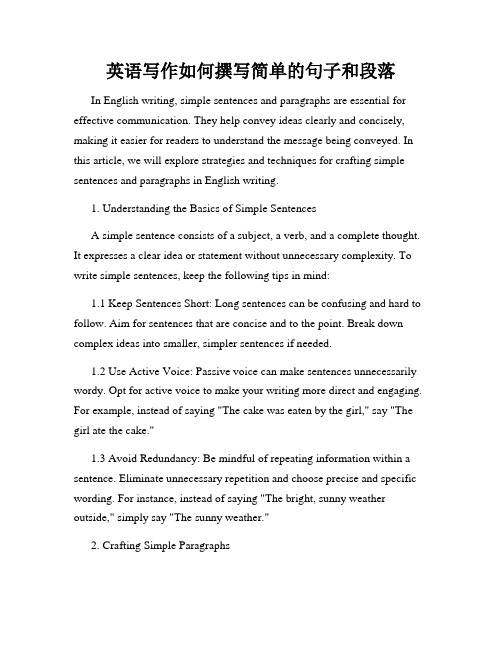
英语写作如何撰写简单的句子和段落In English writing, simple sentences and paragraphs are essential for effective communication. They help convey ideas clearly and concisely, making it easier for readers to understand the message being conveyed. In this article, we will explore strategies and techniques for crafting simple sentences and paragraphs in English writing.1. Understanding the Basics of Simple SentencesA simple sentence consists of a subject, a verb, and a complete thought. It expresses a clear idea or statement without unnecessary complexity. To write simple sentences, keep the following tips in mind:1.1 Keep Sentences Short: Long sentences can be confusing and hard to follow. Aim for sentences that are concise and to the point. Break down complex ideas into smaller, simpler sentences if needed.1.2 Use Active Voice: Passive voice can make sentences unnecessarily wordy. Opt for active voice to make your writing more direct and engaging. For example, instead of saying "The cake was eaten by the girl," say "The girl ate the cake."1.3 Avoid Redundancy: Be mindful of repeating information within a sentence. Eliminate unnecessary repetition and choose precise and specific wording. For instance, instead of saying "The bright, sunny weather outside," simply say "The sunny weather."2. Crafting Simple ParagraphsParagraphs are the building blocks of coherent writing. They consist of a group of related sentences that develop a single idea or topic. Follow these guidelines to create simple and well-structured paragraphs:2.1 Topic Sentence: Each paragraph should have a clear topic sentence that introduces the main idea or point you want to convey. The topic sentence sets the tone for the entire paragraph and provides a roadmap for the reader.2.2 Unity and Coherence: Ensure that all sentences within a paragraph are closely connected and support the main idea. Avoid introducing unrelated ideas or random tangents that can confuse the reader.2.3 Transition Words: Use appropriate transition words and phrases to create smooth transitions between sentences and paragraphs. Words like "however," "additionally," and "in conclusion" help maintain the flow of ideas and improve the overall readability.3. Utilizing Sentence Structure TechniquesVarying sentence structure can add depth and interest to your writing. Here are some techniques to employ:3.1 Simple Sentence Structure: As mentioned earlier, simple sentences consist of a subject and a verb. Use them when conveying straightforward ideas. For example, "She ran."3.2 Compound Sentences: Combine two simple sentences using coordinating conjunctions (such as "and," "but," or "so") to create compound sentences. For instance, "She ran, and he followed."3.3 Complex Sentences: Incorporate complex sentences to provide more detailed information or clarify relationships between ideas. Complex sentences contain a dependent clause and an independent clause. For example, "Although she was tired, she kept running."4. Reviewing and EditingAfter writing, take the time to review your work to ensure clarity. Edit for grammar, spelling, and punctuation errors. Consider seeking feedback from others to gain different perspectives and improve your writing.In conclusion, mastering the art of writing simple sentences and paragraphs is crucial for effective English communication. By understanding the basics, crafting well-structured paragraphs, utilizing different sentence structures, and thoroughly reviewing your work, you can enhance your writing skills and create clear, concise, and engaging content. Practice these techniques regularly, and with time, you will become a more proficient English writer.。
初中英语作文写作步骤和语法技巧
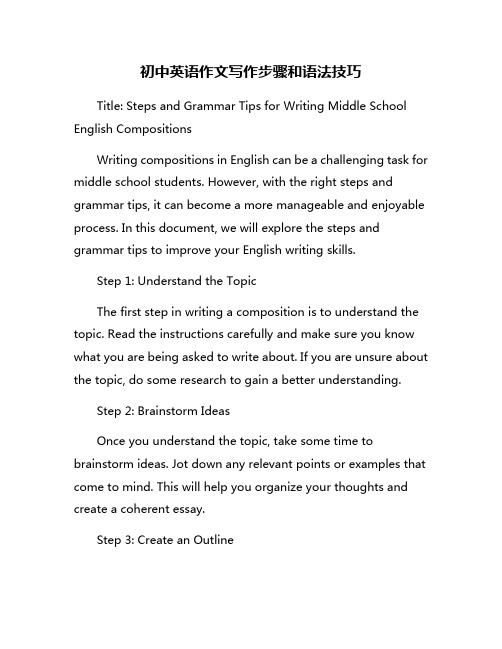
初中英语作文写作步骤和语法技巧Title: Steps and Grammar Tips for Writing Middle School English CompositionsWriting compositions in English can be a challenging task for middle school students. However, with the right steps and grammar tips, it can become a more manageable and enjoyable process. In this document, we will explore the steps and grammar tips to improve your English writing skills.Step 1: Understand the TopicThe first step in writing a composition is to understand the topic. Read the instructions carefully and make sure you know what you are being asked to write about. If you are unsure about the topic, do some research to gain a better understanding.Step 2: Brainstorm IdeasOnce you understand the topic, take some time to brainstorm ideas. Jot down any relevant points or examples that come to mind. This will help you organize your thoughts and create a coherent essay.Step 3: Create an OutlineBefore you start writing, create an outline of your composition. An outline can help you organize your ideas and ensure that your essay follows a logical structure. Include an introduction, body paragraphs, and a conclusion in your outline.Step 4: Write the IntroductionBegin your composition with an engaging introduction that introduces the topic and gives readers an idea of what to expect. Grab the reader's attention with a hook and provide some background information on the topic.Step 5: Develop the Body ParagraphsThe body paragraphs of your essay should expand on the points you introduced in the introduction. Each paragraph should focus on a different idea or argument and provide supporting evidence or examples.Step 6: Write the ConclusionSummarize your main points and restate your thesis in the conclusion. End your essay with a strong closing statement that leaves a lasting impression on the reader.Grammar Tips:1. Use Proper Punctuation: Make sure to use correct punctuation, such as commas, periods, and quotation marks, to enhance the clarity of your writing.2. Watch Your Verb Tenses: Pay attention to verb tenses and ensure they are consistent throughout your composition. Avoid switching between past, present, and future tenses in the same paragraph.3. Use Transition Words: Transition words and phrases can help improve the flow of your writing and make your composition more cohesive. Examples of transition words include "however," "furthermore," and "on the other hand."4. Check for Spelling and Grammar Errors: Proofread your composition carefully to catch any spelling or grammar mistakes. Use a dictionary and grammar guide to help you correct errors.By following these steps and grammar tips, you can improve your English writing skills and create well-structured compositions that effectively convey your ideas. Practice writing regularly to further enhance your writing abilities. Good luck!。
- 1、下载文档前请自行甄别文档内容的完整性,平台不提供额外的编辑、内容补充、找答案等附加服务。
- 2、"仅部分预览"的文档,不可在线预览部分如存在完整性等问题,可反馈申请退款(可完整预览的文档不适用该条件!)。
- 3、如文档侵犯您的权益,请联系客服反馈,我们会尽快为您处理(人工客服工作时间:9:00-18:30)。
Topic S entences: P ractice
Read t he p aragraphs b elow. T hey a re m issing a t opic s entence. W rite a t opic s entence t hat introduces t he m ain i dea o f e ach p aragraph.
*Note: Y ou d o n ot h ave t o u se a s imile o r m etaphor, b ut s ometimes t hese a re g ood w ays t o write i nteresting t opic s entences.
____________________________________________________________________. Who takes care of you? Who supports you? Who sees you grow up? Family is very important. My family has six people: my grandma, my parents, myself, and my two brothers. My grandma loves me very much. When the weather is cold, she always tells me to wear more clothes. Although I often argue with my brothers, they will give me support when I need it. My parents have taken care of me since I was born. My definition of family is an organization which is full of love.
____________________________________________________________________. When you travel to Europe, you can visit many different countries, such as England, Spain, Germany, and Greece. Many different languages are spoken in Europe, and the cultures of the countries are all unique. Also, the weather in Europe varies a lot. Countries in the north are very cold, and you can go skiing. In the south, there are beautiful beaches, and these are popular places for vacations. As you can see, Europe is a very interesting place with different kinds of people and many possibilities.
____________________________________________________________________. Her name is Mrs. Graham, and she not only teaches music in my school, but she is also a friend to all of her students. In class, she teaches us to love music, and she introduces us to different songs and styles of music. She taught me to play the piano and violin, and I am sure that I will enjoy playing these instruments for the rest of my life. Mrs. Graham often tells interesting stories in class, and she always helps us or gives us advice when we have problems. Mrs. Graham is more than just a music teacher, she is like a star in the sky.。
